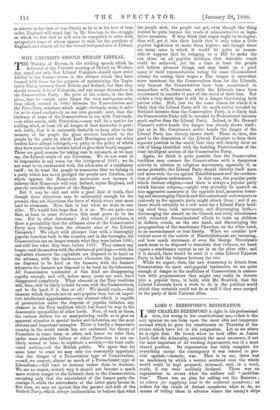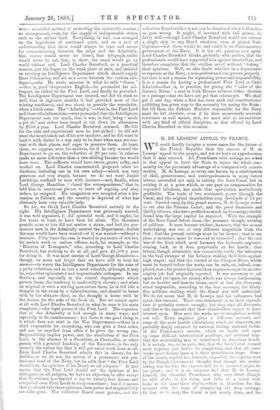LORD C. BERESFORD'S RESIGNATION. ORD CHARLES BERESFORD is right in
his professional J view, but wrong in his constitutional one,—that is the only opinion we can form upon the most able and temperate account which he gave his constituents on Thursday of the events which have led to his resignation. Let us see where he is right first. He found, when he took office as Junior Lord, that the Admiralty, certainly the most necessary, if not the most important of all working departments, was in a most absurd position. Its organisation was fairly complete for everything except the contingency it was created to pro- vide against,—namely, war. That is to say, there was no machinery by which a service scattered over the whole world could be kept prepared, informed, and, in a word, ready, if war were suddenly declared. There was no organisation to secure what the soldiers call "mobiliza- tion." There was no plan for calling out the Reserves ; no scheme for supplying coal to the scattered squadrons; no orders for the chiefs of distant squadrons what to do, no means of telling them in advance where the enemy's ships
were ; no settled method of protecting the mercantile marine ; no arrangement, even, for the supply of indispensable stores, such as the sailors' food. Everything, in fact, was arranged on the hypothesis of continued quiet, and on a sort of understanding that there would always be time and means for communicating between the ships and the Admiralty, that routes would never be closed, that telegraph-cables would never be cut, that, in short, the usual would go on world without end. Lord Charles Beresford, as a practical seaman, put his finger on the weak place at once, and insisted on creating an Intelligence Department which should supply these deficiencies, and act as a nexus between the various sub- departments. He wrote minutes in what he calls " Saxon " —that is, good vituperative English—he persuaded his col- leagues, he talked to the First Lord, and finally he prevailed.
The Intelligence Department was created, and did its work so well, that in eighteen months it had provided most of the missing machinery, and was about to provide the remainder, when a hitch came. The " Admiralty "—that is, the First Lord and those who inform him—were persuaded that the Intelligence Department cost too much, that it was, in fact, being "made a pet of," and orders were issued to cut down its allowances by £950 a year. Lord Charles Beresford stormed. He felt for the able and experienced men he had picked ; he did not want the heart taken out of his new machine, and he did want to load it with duties in a way only to be done when men are con- tent with their places, and eager to preserve them. At least, those, we suppose, were his motives, for if he only wanted the Department to go on, the reduction of 20 per cent, in salaries made no more difference than a two-shilling Income-tax would have done. The sufferers would have sworn, grown sulky, and worked on. Lord Charles remonstrated, proposed other re- ductions, including one in his own salary—which was very generous and very stupid, because we do not want Junior Lordships confined to men with incomes—and, finally, when Lord George Hamilton "closed the correspondence," that is, told him in courteous phrase to leave off arguing and obey orders, he resigned. His resignation was accepted after a dis- cussion in Cabinet, and the country is deprived of what has obviously been very valuable help.
So far, we think Lord Charles Beresford entirely in the right. His Intelligence Department was grievously wanted, it was well organised, it did splendid work, and it ought, for five years at least, to have been let alone. The thousand pounds more or less did not matter a straw, and had the per- manent men in the Admiralty created the Department, double the sum would have been wasted—if it was wasted—without a murmur. Fifty times the sum is wasted in payments of routine, for useless work or useless officers, such, for example, as the "Director of Transports," who, according to Lord Charles Beresford, has nothing to do at all, and gets £1,500 a year for doing it. It was most unwise of Lord George Hamilton— though we must not forget that we have still to hear his answer—to worry the Intelligence Department for the sake of a petty reduction, and so lose a most valuable, although, it may be, somewhat opinionated and impracticable colleague. In our Services, and especially in the central departments which govern them, the tendency to mediocrity is chronic ; and when an original or even a stirring man enters them, he is felt like a draught in the room by a valetudinarian, and should be borne with by his ultimate chief, as the draught is borne with by the doctor, for the sake of the fresh air. But we cannot agree at all with Lord Charles Beresford in what he says is his main complaint,—the legal power of the First Lord. The organisa- tion of the Admiralty is bad enough in many ways, and especially in its cumbrousness ; but there is one good thing in it which does not exist in the War Department,—there is a chief responsible for everything, who can give a final order, and can be expelled from office if he gives the wrong one. Responsibility implies power, and the absolutism of the First Lord, in the absence of a President, or Chancellor, or other person with a general headship of the Executive, is the only security the nation has that it will get naval work done at all. Even Lord Charles Beresford admits this in theory, for he dislikes, as we do not, the notion -of a permanent and pro- fessional head of the Navy, but he adds that "the First Lord should take the opinions of his Board on all subjects." If that means that the First Lord should ask the opinions of his colleagues on all subjects, we have no objection to offer except that Providence has limited a day to twenty-four hours, and compelled even First Lords to sleep sometimes ; but if it means that he should take those opinions, then power and responsibility are alike gone. The collective Board must govern, and the collective Board neither is nor can be dismissed when it blunders or goes wrong. It might, if invested with full power, do fairly well—though Lord Charles Beresford would not entrust a single ship to any Board whatever, even of picked Post- Captains—but there would be and could be no Parliamentary government of the Navy. It is the old question over again. Lord Charles Beresford thinks, probably with justice, that the professionals would have supported him against the civilian, and therefore complains that the civilian acted without " taking " their opinions. Well, we also doubt whether in a department so separate as the Navy, a non-professional can govern properly ; but that is not a reason for separating power and responsibility. It is a reason for having a professional First Lord or Chief Admiral—that is, in practice, for giving the " ruler of the Queen's Navee" a seat in both Houses without either election or a peerage—but we have not got that reform yet. We shall get it one day, when a fleet has been sunk and constitutional quibbling has given way to the necessity for saving the State ; but till then, the Cabinet Minister responsible for the Navy must be left absolute, even if he does occasionally overrule resistance as well meant, and, we must add, as inconsistent with any kind of official discipline, as that offered by Lord Charles Beresford on this occasion.



















































 Previous page
Previous page